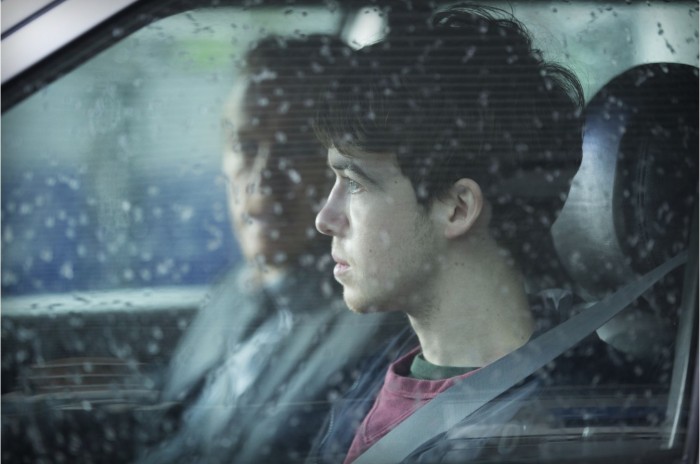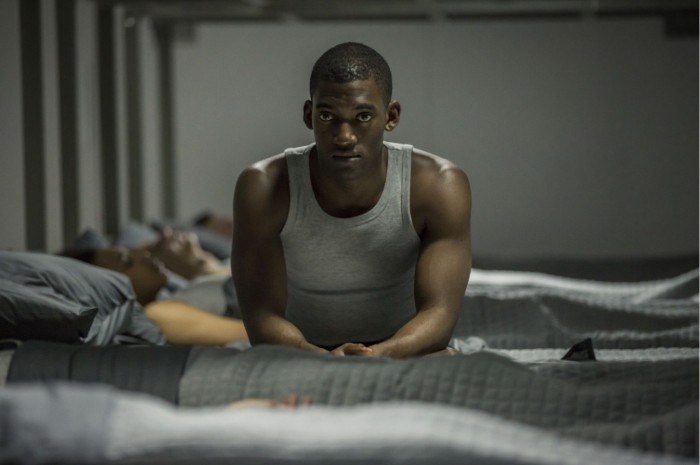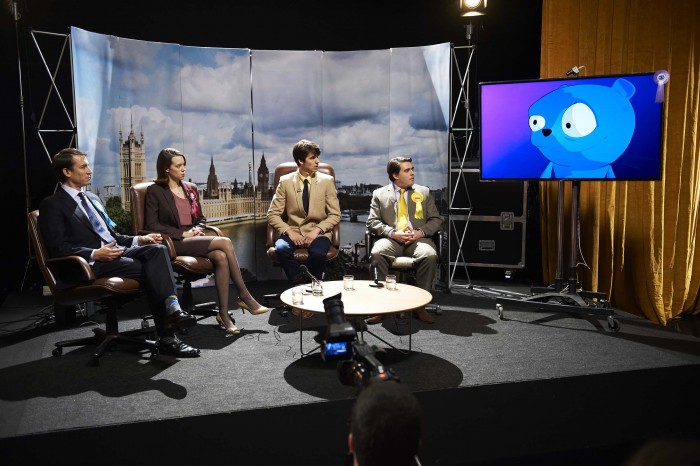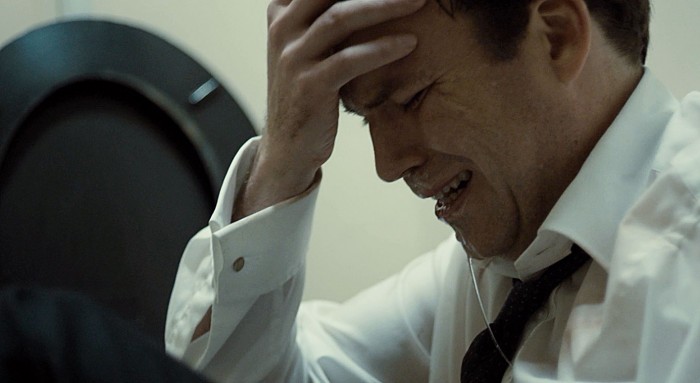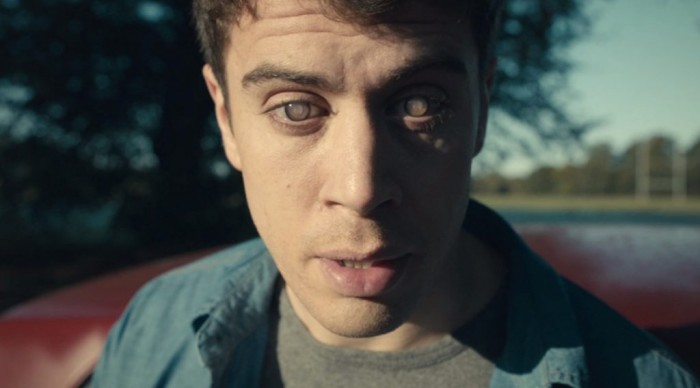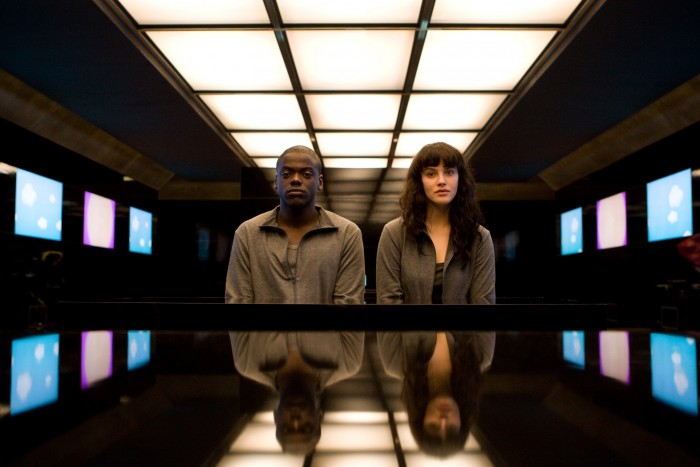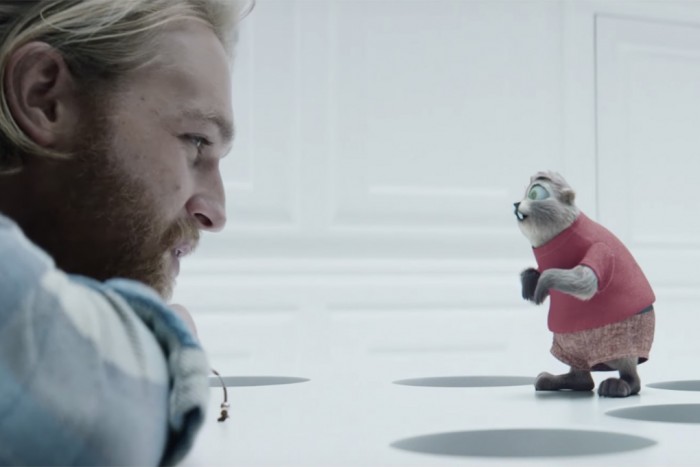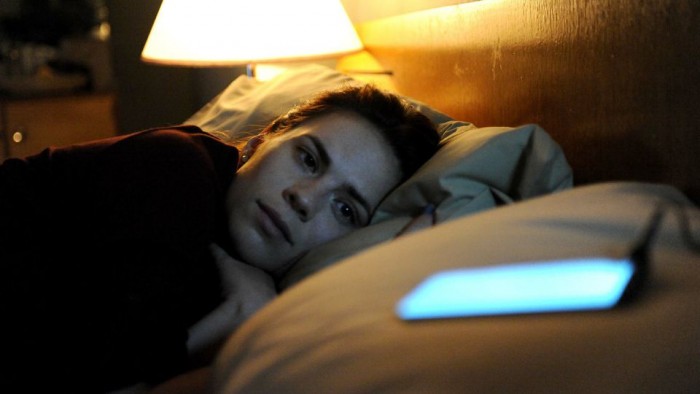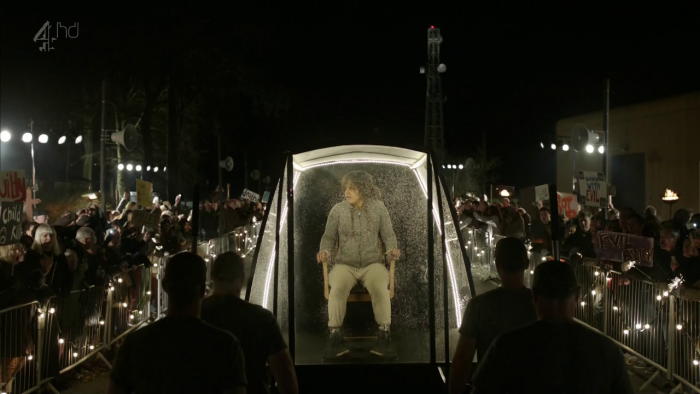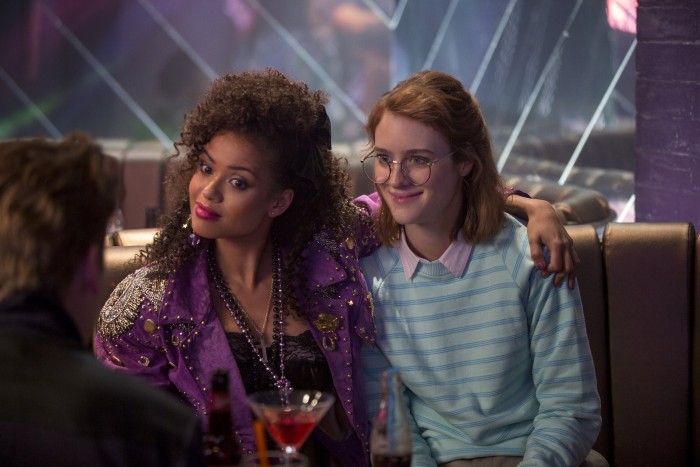Through A Touchscreen Darkly: Every 'Black Mirror' Episode Ranked
Like everyone else with a Netflix account, I've spent the past week making my way through season three of Black Mirror, savoring creator Charlie Brooker's latest batch of science fiction, horror, satire, and social commentary like a fine, evil, thoughtful wine. There is nothing else on television (or on streaming services) quite like this show, which proves that we're all gluttons for punishment – realizing that humanity is probably doomed and that our addition to technology will be our undoing has never been this addictive.
And since is the internet, I must now do as internet-dwellers do. I must rank all 13 episodes of Black Mirror from worst to best. It should go without saying that MAJOR SPOILERS follow from here on out.
13. Shut Up and Dance (Season 3)
It's not that "Shut Up and Dance" is a bad hour of entertainment – it's that it's a half-measure approach to a concept we've seen done a dozen times before and frequently executed with more menace and wit. If the script had taken things to an extreme, if the trials the lead characters are forced to endure got as intense and unsettling as those seen in other "mysterious texts/voices force people to participate in a series of escalating trials" thrillers, it could have overcome its lack of originality. Because as it stands now, it's an average thriller at best that never offers anything beyond its familiar surface. Despite strong leading performances from Alex Lawther and Jerome Flynn, "Shut Up and Dance" is the only episode of Black Mirror that leaves you with nothing to think about and nothing to dwell upon. There is nothing said here that isn't already explored with more originality and cleverness in "White Bear" and "Hated in the Nation."
12. Men Against Fire (Season 3)
Black Mirror has been frequently compared to The Twilight Zone, which is accurate enough. Both are anthology shows that utilize science fiction, horror, satire, and even elements of fantasy to explore our own modern world. Both are generally very good at embedding messages and themes within their storytelling. And sometimes, both wear their heart on their sleeves in such an obvious manner that characters literally pause to explain what you should be thinking and how you should be feeling.
"Men Against Fire" is easier to appreciate than it is to actually like, mainly because it has so much on its mind and wants to tackle subjects that need to be tackled. The programming of soldiers. The dehumanization of enemy combatants. How entire cultures quietly condone genocide, as long as it's not happening to them. At its best, "Men Against Fire" is a thoughtful and intense commentary on everything from drone warfare to post-traumatic stress disorder. At its worst, it's (the admittedly compelling) Michael Kelly sitting in an interrogation room and explaining to (the absolutely terrific) Malachi Kirby everything the audience needs to know. It's a classic case of a story telling rather than showing, a sin for an episode that all about how we choose to see the world.
11. The Waldo Moment (Season 2)
In the television history books, "The Waldo Moment" will go down as the television episode that foresaw the American presidential election of 2016, the hour of science fiction satire that envisioned a political race where good taste was thrown out the window, where the phrase "media circus" started to feel a little too literal, with a political campaign with a literal cartoon character at the center of it all. In retrospect, the episode has only grown in power because its horrifying core idea has stopped feeling quite as outlandish. Observed in a bubble, it's a fine episode that checks all of the proper Black Mirror boxes: it's funny and sad and cynical and uses near-future science fiction to explore how humanity is more than willing to vote against its own self-interest if there's a laugh to be had.
10. The National Anthem (Season 1)
The first episode of Black Mirror stands apart from almost every other episode of the series, taking place in the here and now with nary a single science fiction element to be seen. But like the rest of the show, "The National Anthem" is all about how we've let technology dominate our lives and how we are simultaneously at its mercy and completely addicted to it. The sick joke at the heart of this story, where England's Prime Minister is manipulated into a horrific sex act on live TV as part of a twisted social media plot, would have felt like pure science fiction a decade ago. Now, it feels all too real. It could happen tomorrow, if the right elements aligned. And if this, the first shot across the bow from a show with both eyes on the near future, feels so unsettlingly plausible, what does that mean for the rest of the series? If you believe Black Mirror takes place in a shared world and that each episode occurs at a different point on the same timeline, "The National Anthem" is the insane event that made everything else possible. It's a warning.
9. Nosedive (Season 3)
Quite possibly the most stylized episode of the entire series thus far, "Nosedive" benefits from its stellar production values and director Joe Wright's eye painting on a larger canvas. Most episodes of Black Mirror feel like snapshots into the corner of a twisted world, but this is more of a panoramic road trip through a very special kind hell. The core concept, that everyone rates every person they meet with a five-star scale and that everything from their job to their social circle to how they can travel is dependent on their rating, sounds outlandish until you realize that China is already looking into a similar program. It sounds implausible until you remember that getting Twitter and Facebook likes feels so good and that the gamification of our everyday lives has already begun.
I'm reminded of Jon Ronson's incredible book So You've Been Publicly Shamed (a necessary companion for anyone who watches Black Mirror), which explores how a single bad tweet or one ill-thought-out Facebook post can destroy an entire life – our lives are online, we live in the public eye, and everyone is scrutinized by default. There is a lot on this episode's plate and "Nosedive" occasionally veers towards obvious conclusions in between scenes of incredible discomfort and quiet horror, relying on Bryce Dallas Howard's fearless performance to smooth over any rough edges. The final scene, where two characters find themselves literally disconnected and rediscover the joy of honesty, is simultaneously cathartic and on-the-nose.
8. Hated in the Nation (Season 3)
So much of "Hated in the Nation" is smart and weird and fascinating that it's a shame the whole thing isn't just a little bit tighter. At 90 minutes, it is more of a film than a television episode and much of the story feels like it would have more punch if the fatty bits were stripped out entirely. Still, this is a quality detective story set in a truly unique science fiction landscape that is just alien enough for characters to shrug off robotic bees and just recognizable enough for the audience to have an emotional stake in it.
The best thing "Hated in the Nation" has going for it is that the murder mystery that Kelly Macdonald's detective is genuinely intriguing on its own. The commentary on social media abuse and the how the internet reduces people to names instead of human beings is ultimately window-dressing for watching an appealing cop and her mismatched partner (Faye Marsay) tackle a case, with each one of them contributing their own unique skill sets to the case. Come for the scathing takedown of Twitter pile-ons, stay for the surprisingly good buddy cop story.
7. The Entire History of You (Season 1)
This is bread-and-butter Black Mirror: you introduce a piece of science fiction technology into a real-world setting or relationship, allow that technology to amplify the emotions that would already be present, and watch as those involved circle the drain, their lives undone by their own actions and feelings that were simply enhanced by the presence of that technology. In "The Entire History of You," that tech is the "grain," a tiny implant behind the ear that records everything you see, allowing you to keep a database of your memories on hand to revisit and share with friends. It also means that everyone essentially has a perfect memory and that lies, of both the white and non-white variety, have become impossible to hide. Strip away the science fiction and you're still left with a skin-crawling tale of marital infidelity and toxic masculinity that bruises the soul. Here is Black Mirror doing what only Black Mirror can do – it packages that emotional turmoil in genre concepts that ease you into the trap and only make the final gut punch all the more painful.
6. Fifteen Million Merits (Season 1)
When I think about "Fifteen Million Merits," I think about how we've decided that microtransactions are okay and how insane that is. At some point, we decided that paying a little extra to skip an advertisement or make a digital avatar look a little cooler is perfectly fine. People are becoming increasingly cool with not owning things, with relying on the free entertainment presented to us and waving away potential inconveniences with a buck here or there because it's just a buck, right? "Fifteen Million Merits," the first great episode of Black Mirror, takes the world of YouTube and mobile gaming and pushes it to hellish extremes, presenting a future world where money simultaneously means nothing and everything, where ads literally invade your home and will pause if you close your eyes. But more frightening than this theoretical hellscape, which exaggerates current ideas for satiric effect, is the ultimate conclusion: when you do fight against the system, the system will fight back by simply co-opting you, taking your rage and your rebellion and packaging it and selling it and making it the new normal. And that's real enough to be terrifying beyond the theoretical.
5. Playtest (Season 3)
Many episodes of Black Mirror are disquieting or uncomfortable, but "Playtest" is truly scary in the more visceral sense of the word. Director Dan Trachtenberg, whose 10 Cloverfield Lane is a claustrophobic gem, has made a new kind of haunted house movie, where the ghosts that haunt us are only those that we carry with us. Literally. Because it's about an augmented reality video game that reads your thoughts to generate your greatest fears. Most episodes of Black Mirror make the show feel like the natural successor to The Twilight Zone, but "Playtest" has more in common with The Outer Limits – it's gnarlier, spookier, and more concerned with giving the audience a nasty and mean-spirited jolt than laying on the social commentary. Ultimately, all of those scares climax with an ending that is inscrutable in the best possible ways, complete with a final shot that is simultaneously hilarious and downright evil. And one more thing: Wyatt Russell, who spends much of the episode alone in an empty house, is a future movie star. Mark these words.
4. Be Right Back (Season 2)
The best genre fiction uses outlandish concepts to comment on ideas and feelings that are all too real and all too familiar. "Be Right Back" is a deeply unsettling blend of horror and science fiction, but it's also a portrait of grief that cuts hard and deep, exploring how losing a loved one is a messy ordeal that creates incurable wounds and how memories can linger and fester in those wounds. Hayley Atwell is devastating as a young widow whose husband dies in a car accident. Domhnall Gleeson is chilling as the artificial intelligence version of her late husband that is created by scanning all of his social media interactions to approximate his personality. Her work is raw and fearless – his work is so close to human but just off enough to inspire the proper level of discomfort.
"Be Right Back" is a fable about letting go, about how the healing process can only be complete when you have moved on. But its great power is that genre twist, which takes those painful memories of the people you love and makes them literal. Even after you've moved on, even after you've made the decision to take the next step forward, those you've lost will never leave you. They'll always be in the attic.
3. White Bear (Season 2)
For its first 30 minutes, "White Bear" is the worst episode of Black Mirror. It's indefensible, even. A show that has explored the horrors of technology in ways that were smart and clever and funny has seemingly decided to make a lousy horror movie, one part 28 Days Later and one part Stephen King's Cell, with only a thin and obvious layer of social commentary lazily draped over the whole thing. And then, somehow, "White Bear" becomes one of the best episodes of Black Mirror, taking its final 15 minutes to re-contextualize everything you've just seen and make you feel like a doofus for ever doubting the show in the first place. Because "White Bear" isn't a grim and gross tale of post-apocalyptic horror – it's a scathing condemnation of punishment as entertainment, a blistering attack on how we make a game out of suffering and take pleasure in the pain of others (even when we think they deserve it). Modern media has allowed real-life crimes can evolve into thinly-veiled reality shows, an excuse for the viewer at home to follow along and play detective, so the episode's suggestion that we would happily participate in ongoing capital punishment after the fact is as chilling as anything I've ever seen. Justice must be served. But do try to enjoy yourselves.
Because "White Bear" isn't a grim and gross tale of post-apocalyptic horror – it's a scathing condemnation of punishment as entertainment, a blistering attack on how we make a game out of suffering and take pleasure in the pain of others (even when we think they deserve it). Modern media has allowed real-life crimes can evolve into thinly-veiled reality shows, an excuse for the viewer at home to follow along and play detective, so the episode's suggestion that we would happily participate in ongoing capital punishment after the fact is as chilling as anything I've ever seen. Justice must be served. But do try to enjoy yourselves.
2. White Christmas (Season 2)
Black Mirror's Christmas special features one of the single most upsetting concepts ever introduced in the realm of fictional entertainment: the "Cookie." This device, a tiny little egg that operates your smart home and ensures that everything about your living experience is to your liking, houses something indescribably awful. The reason it can run your house so well, the reason it can cater to your every whim before you even know what you want, is that it's operated by an artificial intelligence that was cloned from your own mind. As far as the Cookie is concerned, it is you. It has your memories, your tastes, and knows exactly how you like your home. And it is a slave, psychologically tortured and broken by a specialist who removes the AI's will to resist with time manipulation. It is the duty of this copy of your consciousness, this little you, to serve you the rest of its life, to watch from a tiny prison as the other you, that you that it truly thinks it is, live your life. I have nightmares about the Cookie.
Of course, the Cookie is only one element of "White Christmas," an all-time great 90-minute episode that may be the finest feel-bad experience in television history. The episode begins with a vague mystery (who are these two men played by Jon Hamm and Rafe Spall and where are they living?) and spirals out from there, slowly introducing new horrors and that interlock to form a tapestry of sci-fi misery that has to be endured to be believed. It would be all too much if it wasn't also so darkly funny, so morbidly fascinating, and so recognizably human.
1. San Junipero (Season 3)
I still haven't decided if the final scene of "San Junipero" is the most cynical thing Black Mirror has ever done or if it's one the most romantic and beautiful moments in all of science fiction. That it can be read either way is a testament to how good this show can be and how, when it's at its best, it refuses to cast judgment on technology, using tech as a lens for us to examine humanity from a unique angle. Right now, I'm choosing to believe that the ending of "San Junipero" is presented honestly and that is a rare example of the show deciding to reward its characters rather than punish them.
But the episode is far more than its memorable ending, which also manages to forever redefine how we'll listen to a certain '80s pop song. It is a remarkable love story between two women (Gugu Mbatha-Raw and Mackenzie Davis in remarkable performances), told in a way that only Black Mirror could accomplish. It is a parade of smart and wicked ideas, all of which exist to enhance the two leads and offer new avenues from which we can understand them better. It has the kind of wry commentary you'd expect from this show ("nostalgia therapy" for people is ridiculously on point for a generation that is obsessed with Stranger Things), but it pulls back on the cruelty and amps up the understanding, the romance, the empathy, and the humanity. If there's anything wrong with "San Junipero," it's that it's not indicative of what Black Mirror is as a whole. It would be unfair to make it someone's first episode because it would give them the wrong impression.
And yet, it is the show's finest hour and proof that the series is more than misery and darkness. We all got addicted to this show in the first place because it's so very good at being miserable. That it can also be joyous is evidence that the show is growing into something greater. "San Junipero" feels like a promise – Black Mirror will never stop surprising us.

